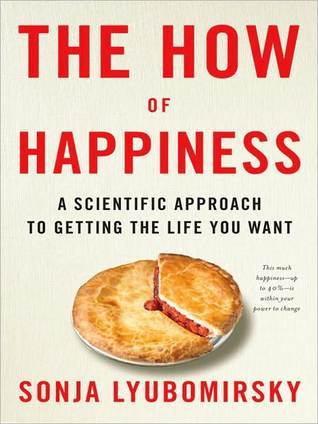 The How of Happiness: A Scientific Approach to Getting the Life You Want by Sonja Lyubomirsky
The How of Happiness: A Scientific Approach to Getting the Life You Want by Sonja Lyubomirsky Published by Penguin Books on December 27, 2007
Source: Purchased
Genres: Psychology, Self-help
Pages: 396
Format: eBook
Purchase at Bookshop.org
Add on Goodreads

Learn how to achieve the happiness you deserve
You see here a different kind of happiness book. The How of Happiness is a comprehensive guide to understanding the elements of happiness based on years of groundbreaking scientific research. It is also a practical, empowering, and easy-to-follow workbook, incorporating happiness strategies, exercises in new ways of thinking, and quizzes for understanding our individuality, all in an effort to help us realize our innate potential for joy and ways to sustain it in our lives. Drawing upon years of pioneering research with thousands of men and women, The How of Happiness is both a powerful contribution to the field of positive psychology and a gift to people who have sought to take their happiness into their own hands.
I’ve been doing The Science of Well-Being class on Coursera, and one of the books the professor, Laurie Santos, mentioned was The How of Happiness by Sonja Lyubormirsky, so being the person that I am, I picked it up.
According to Lyubomirsky, 50% of your happiness level is genetic, you can’t change it. By nature, you have a set happiness point that may be higher or lower or right on track with the average. 10% of your happiness is based on life circumstances, like being married or divorced, rich or poor, healthy or ill. That leaves 40% that we can directly effect. She gives research to back up these numbers. The remainder of the book is about ways to improve that 40% of our happiness we have control over, activities we can do to become happier.
There are several “quizzes” in the book to help you find your current happiness level, and find which happiness strategies will play to your strengths. The way the book is set up, if you want to just read the sections develop on your strengths, you can. I read the whole thing, but will probably go back and review a couple of chapters that spoke to me the most.
Lyubomirsky gives us strategies to increase our happiness:
- Expressing gratitude
- Cultivating optimism
- Avoiding overthinking and social comparison
- Practicing acts of kindness
- Nurturing social relationships
- Developing strategies for coping
- Forgive
- Increasing flow experiences
- Savoring life’s joys
- Committing to your goals
- Practicing religion and spirituality
- Taking care of your body
For each topic, she explains the research behind it and goes into detail about studies she and others have done. She then gives several concrete activities to do and guidance on how to put the strategies into action. Some may seem a little cheesy but that doesn’t mean they won’t make you an overall happier person. I like that it’s not all wishy-washy, that it gives you actual things to do and recognizes that not everything works for everyone.
Lyubomirsky does make sure to tell people that if they’re actually depressed, while her suggestions may help some, they need to go to see a therapist. Managing depression is beyond the scope of this book.
Even though the book is full of studies and statistics, it’s readable and easy to understand. Most people will find something in it to relate to and/or an activity to pursue. It’s not ground-breaking and a lot of the things you’ve probably heard before, but putting them all together like this makes sense. I think this is a book I will refer back to, but I think I’m getting a bit more out of the Coursera class and its homework.
